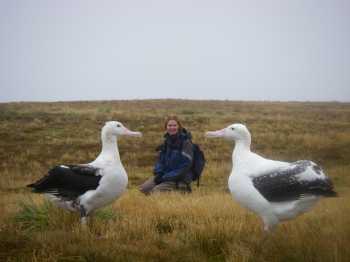Genevieve Jones of the University of Cape Town's Percy FitzPatrick Institute studied Wandering Albatrosses Diomedea exulans at sub-Antarctic Marion Island towards her PhD, awarded in 2011 (click here).
Genevieve has now published along with colleagues an aspect of her doctoral research on extra-pair paternity in the journal Behavioral Ecology and Sociobiology.
The paper's abstract follows:
"Genetic techniques have revealed surprisingly high rates of extra-pair paternity (EPP) in socially monogamous albatrosses. We sought to establish social and genetic influences on EPP in wandering albatrosses (Diomedea exulans) at Marion Island, where EPP rates were 14-24 % in three successive seasons. EPP probably resulted from both female solicited extra-pair behaviours and male forced copulations. EPP was not linked to breeding experience nor with poor reproductive performance, despite a tendency for pairs to consistently produce either EPP or within-pair paternity (WPP) chicks. Mate guarding may inhibit extra-pair behaviour; however, parental arrival date and presence in the colony prior to laying did not correlate with EPP. There was little support for genetic advantages to producing EPP chicks, but the population is characterised by low genetic variability, which may result in mate incompatibility. Mates of pairs that failed and pairs producing EPP young tended to be more similar genetically to their partners than mates producing WPP young, suggesting that EPP may counter mate incompatibility. EPP and WPP chicks grow equally well, so cuckolded males did not reduce investment in EPP chicks. The lack of discriminatory behaviour by cuckolded males together with low genetic diversity in the population may allow continued high levels of EPP. In albatrosses, pair bonds are typically long lasting and the costs of forming new pairings may discourage mate swapping. Females may undertake extra-pair copulations as an adaptive alternative to mate swapping because the costs of extra-pair behaviour are small."

Gen and friends at Marion Island
Reference:
Jones, M.G.W., Techow, N.M.S.M. & Ryan, P.G. 2012. Dalliances and doubtful dads: what determines extra-pair paternity in socially monogamous wandering albatrosses? Behavioral Ecology and Sociobiology DOI: 10.1007/s00265-012-1374-8.
With thanks to Genevieve Jones for information and photograph.
John Cooper, ACAP Information Officer, 6 July 2012

 English
English  Français
Français  Español
Español